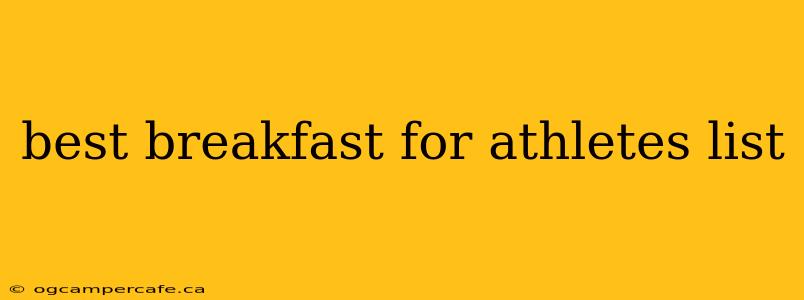Breakfast is undeniably the most important meal of the day, but for athletes, it takes on a whole new level of significance. It's the crucial first step in fueling your body for training, competition, and recovery. This isn't just about grabbing something quick; it's about strategically selecting foods that provide the optimal balance of macronutrients – carbohydrates, proteins, and healthy fats – to maximize your athletic performance.
This isn't a generic "healthy breakfast" list; this is tailored specifically to the needs of athletes across various disciplines. We'll explore the science behind the best breakfast choices and provide you with actionable ideas to incorporate into your routine.
Understanding the Athlete's Breakfast Needs
Before diving into specific food choices, let's understand the key nutritional requirements for athletes:
-
Carbohydrates: These are your primary energy source, crucial for providing sustained energy during training and competition. Focus on complex carbohydrates like whole grains for slower, sustained energy release, rather than simple sugars that lead to energy crashes.
-
Protein: Essential for muscle repair and growth after intense physical activity. Aim for a good source of protein to aid in recovery and prevent muscle breakdown.
-
Healthy Fats: These provide sustained energy, aid in hormone production, and support overall health. Choose unsaturated fats over saturated and trans fats.
Top Breakfast Choices for Athletes
Here are some of the best breakfast options to fuel your athletic endeavors, categorized for clarity:
High-Carb, Moderate-Protein Options (Ideal for endurance athletes):
-
Oatmeal with Berries and Nuts: Oatmeal provides slow-releasing carbohydrates, berries offer antioxidants and additional carbohydrates, and nuts add healthy fats and protein. Consider adding a scoop of protein powder for an extra protein boost.
-
Whole-Wheat Toast with Avocado and Egg: Whole-wheat toast provides complex carbohydrates, avocado offers healthy fats, and an egg delivers a good dose of protein.
-
Breakfast Burrito with Whole-Wheat Tortilla, Scrambled Eggs, Black Beans, and Salsa: This provides a substantial amount of carbohydrates, protein, and fiber.
Balanced Carb, Protein, and Fat Options (Versatile for most athletes):
-
Greek Yogurt with Fruit and Granola: Greek yogurt is high in protein, fruit adds natural sugars and vitamins, and granola provides carbohydrates and healthy fats (choose a lower-sugar granola).
-
Smoothie with Protein Powder, Fruits, Vegetables, and Nut Butter: A highly customizable option, allowing you to adjust the macronutrient ratios based on your needs.
High-Protein Options (Best for strength training athletes):
-
Scrambled Eggs with Spinach and Whole-Wheat Toast: A classic combination offering a substantial amount of protein from the eggs, vitamins from spinach, and carbohydrates from the toast.
-
Protein Pancakes or Waffles (made with whole-wheat flour): Choose recipes that incorporate protein powder for an extra protein boost. Pair with fruit for added nutrients.
Things to Avoid in an Athlete's Breakfast:
- Sugary cereals: These provide a quick burst of energy followed by a crash.
- Processed pastries: Low in nutritional value and often high in unhealthy fats and sugars.
- Excessive caffeine: While a moderate amount of caffeine can be beneficial, too much can lead to jitters and negatively impact performance.
Hydration is Key!
Remember that hydration is just as crucial as nutrition. Start your day with a large glass of water, and continue hydrating throughout the morning.
Conclusion: Personalize Your Approach
The best breakfast for an athlete isn't a one-size-fits-all answer. The ideal meal will vary based on your individual training intensity, sport, and personal preferences. Experiment with different options to find what works best for your body and fuels your performance. Consider consulting a registered dietitian or sports nutritionist for personalized advice tailored to your specific athletic goals.
